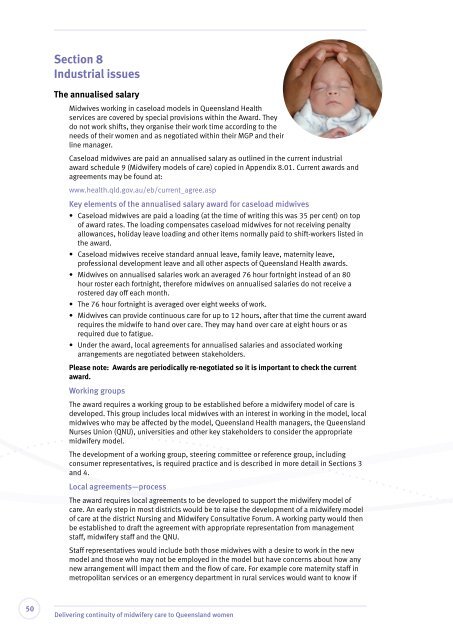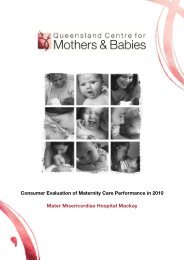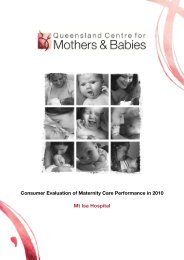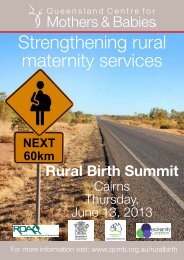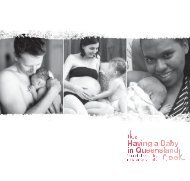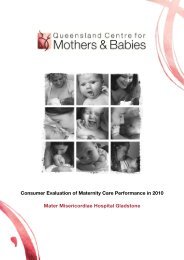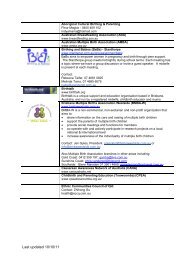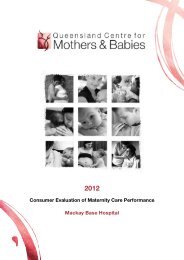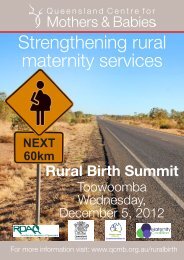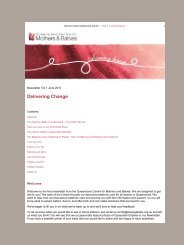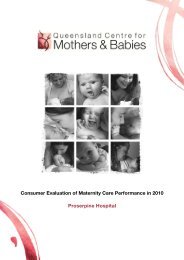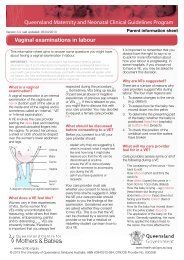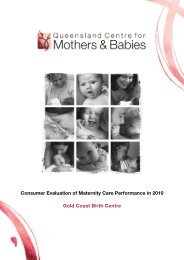Delivering continuity of midwifery care to Queensland women
Delivering continuity of midwifery care to Queensland women
Delivering continuity of midwifery care to Queensland women
Create successful ePaper yourself
Turn your PDF publications into a flip-book with our unique Google optimized e-Paper software.
Section 8<br />
Industrial issues<br />
The annualised salary<br />
Midwives working in caseload models in <strong>Queensland</strong> Health<br />
services are covered by special provisions within the Award. They<br />
do not work shifts, they organise their work time according <strong>to</strong> the<br />
needs <strong>of</strong> their <strong>women</strong> and as negotiated within their MGP and their<br />
line manager.<br />
Caseload midwives are paid an annualised salary as outlined in the current industrial<br />
award schedule 9 (Midwifery models <strong>of</strong> <strong>care</strong>) copied in Appendix 8.01. Current awards and<br />
agreements may be found at:<br />
www.health.qld.gov.au/eb/current_agree.asp<br />
Key elements <strong>of</strong> the annualised salary award for caseload midwives<br />
• Caseload midwives are paid a loading (at the time <strong>of</strong> writing this was 35 per cent) on <strong>to</strong>p<br />
<strong>of</strong> award rates. The loading compensates caseload midwives for not receiving penalty<br />
allowances, holiday leave loading and other items normally paid <strong>to</strong> shift-workers listed in<br />
the award.<br />
• Caseload midwives receive standard annual leave, family leave, maternity leave,<br />
pr<strong>of</strong>essional development leave and all other aspects <strong>of</strong> <strong>Queensland</strong> Health awards.<br />
• Midwives on annualised salaries work an averaged 76 hour fortnight instead <strong>of</strong> an 80<br />
hour roster each fortnight, therefore midwives on annualised salaries do not receive a<br />
rostered day <strong>of</strong>f each month.<br />
• The 76 hour fortnight is averaged over eight weeks <strong>of</strong> work.<br />
• Midwives can provide continuous <strong>care</strong> for up <strong>to</strong> 12 hours, after that time the current award<br />
requires the midwife <strong>to</strong> hand over <strong>care</strong>. They may hand over <strong>care</strong> at eight hours or as<br />
required due <strong>to</strong> fatigue.<br />
• Under the award, local agreements for annualised salaries and associated working<br />
arrangements are negotiated between stakeholders.<br />
Please note: Awards are periodically re-negotiated so it is important <strong>to</strong> check the current<br />
award.<br />
Working groups<br />
The award requires a working group <strong>to</strong> be established before a <strong>midwifery</strong> model <strong>of</strong> <strong>care</strong> is<br />
developed. This group includes local midwives with an interest in working in the model, local<br />
midwives who may be affected by the model, <strong>Queensland</strong> Health managers, the <strong>Queensland</strong><br />
Nurses Union (QNU), universities and other key stakeholders <strong>to</strong> consider the appropriate<br />
<strong>midwifery</strong> model.<br />
The development <strong>of</strong> a working group, steering committee or reference group, including<br />
consumer representatives, is required practice and is described in more detail in Sections 3<br />
and 4.<br />
Local agreements—process<br />
The award requires local agreements <strong>to</strong> be developed <strong>to</strong> support the <strong>midwifery</strong> model <strong>of</strong><br />
<strong>care</strong>. An early step in most districts would be <strong>to</strong> raise the development <strong>of</strong> a <strong>midwifery</strong> model<br />
<strong>of</strong> <strong>care</strong> at the district Nursing and Midwifery Consultative Forum. A working party would then<br />
be established <strong>to</strong> draft the agreement with appropriate representation from management<br />
staff, <strong>midwifery</strong> staff and the QNU.<br />
Staff representatives would include both those midwives with a desire <strong>to</strong> work in the new<br />
model and those who may not be employed in the model but have concerns about how any<br />
new arrangement will impact them and the flow <strong>of</strong> <strong>care</strong>. For example core maternity staff in<br />
metropolitan services or an emergency department in rural services would want <strong>to</strong> know if<br />
50<br />
<strong>Delivering</strong> <strong>continuity</strong> <strong>of</strong> <strong>midwifery</strong> <strong>care</strong> <strong>to</strong> <strong>Queensland</strong> <strong>women</strong>


